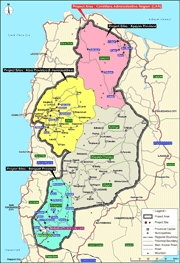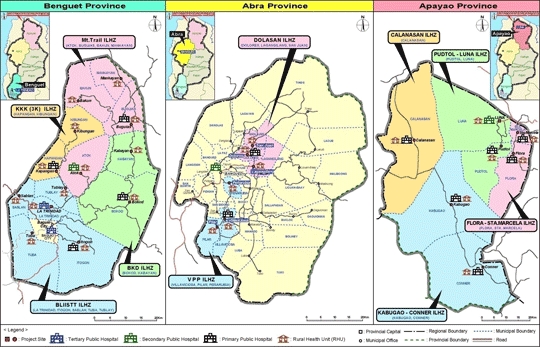Outline of the Project
Title

Project for Cordillera-wide Strengthening of the Local Health System for Effective and Efficient Delivery of Maternal and Child Health Services
Country
Philippines
Date of R/D Signed
Nov. 23, 2011
Term of Cooperation
From Feb. 1, 2012 until Jan. 31, 2017
Counterpart
Implementing Organization : Department of Health, Department of Health Center for Health Development - CAR
Background
The Cordillera Administrative Region (CAR), located in the northern Luzon, has been doubling the effort on strengthening the local health system and health services provision especially for maternal and child health (MCH). However, even though the current implementation is done within the MNCHN Strategy and framework of the Universal Health Care, many challenges are still to be address such as disparities in all aspect of health system. This include: (1) number of public health workers is insufficient and many of the available health personnel are still wanting in competence; (2) many of the facilities are lacking in essential equipment to effectively operate as quality health care providers; (3) drug and medical supply are not available when needed; (4) referral of patient is , in many cases, not timely carried out; and (5) local government units (LGUs) in general do not accord priority consideration to health, as reflected in the inadequate budget allocation for health.
The region have nearly 70 percent of the 1.5 million people belonged to indigenous ethno-linguistic groups. Its mountainous geographic features have left many of the communities in a state of physical isolation. According to the NSCB 2006 report, CAR reflects with high poverty index at the rate of 34.5 percent which is higher than the national average. Abra and Apayao provinces were found to be at the top 10 poorest provinces in the country. It is for these conditions that DOH declared the most areas of CAR as Geographically Isolated and Disadvantaged Areas (GIDA), and considered as priority for health program investment. At the community level, many people do not seek appropriate medical attention because of conflicts with certain cultural and religious convictions, inability to pay for user’s fees and drugs, and lack of awareness on available health services. The demand for maternal and child health services in CAR is expected to remain high due to its large proportion of women in reproductive age and children under five (at 22 percent or 333,882 total population and 12 percent or 188,736 total population, respectively). Hence, effective and efficient delivery of MCH services through the strengthening of local health system is a priority task in the region towards reduction of maternal and infant mortality.
While the region have received technical assistance from Japan International Cooperation Agency through Local Health System Strengthening Project in Benguet Province (2006-2011) and Maternal and Child Health Project in Ifugao Province (2006-2010), there is still a need to address the above concerns to subsidize the effort of DOH for CAR in enhancing the impact of pro-poor intervention for greater health development effectiveness. It is in this regard that an integration of the two projects stated-above is pursued at a region-wide scale which is expected to lead in advancing the regional health system development as well as contributing to the national goal for a sustained improvement in maternal and child health in particular and the overall health condition of the people in the region in general.
Project summary
Duration of the project and project years
From February 2012 to February 2017 (five years or 60 months)
Overall goal
Health status of people in the region is improved, particularly of women and children.
Project purpose: Local health system in the region is strengthened to deliver effective and efficient Maternal and Child Health (MCH) services.
Expected outputs and activities for each output
| Output 1: | Health governance and financing are strengthened through functional Inter-Local Health Zones (ILHZs) in the target sites. |
| 1-1 | Develop unified Local Health System training module consistent with UHC framework and MNCHN strategy. |
| 1-2 | Conduct orientation workshop on re-organization/reconstitution of non-functional ILHZs in the target sites. |
| 1-3 | Establish mechanism on utilization of common health trust fund for ILHZ in the target sites. |
| 1-4 | Develop ILHZ plan that includes MNCHN in the target sites. |
| 1-5 | Advocate PHIC enrollment to local government units in the target sites. |
| Output 2: | Service delivery framework for MCH is strengthened in the target sites. |
| 2-1 | Localize the MNCHN manual for CAR. |
| 2-2 | Adapt the referral manual of Benguet province to strengthen a two-way referral system in the target sites. |
| 2-3 | Conduct trainings on MNCHN manual for the provincial health office. |
| 2-4 | Conduct training on Maternal Death Review for CHD. |
| 2-5 | Conduct regular MNCHN monitoring including MDR by CHD in the target sites. |
| 2-6 | Localize CHT manual for CAR and adapt it to provincial level. |
| 2-7 | Develop culturally appropriate IEC materials for MNCHN by providing IEC training for CHD as needed. |
| 2-8 | Conduct training on setting up and monitoring barangay health emergency and preparedness for PHOs and MHOs in the target sites. |
| Output 3: | Hospitals and Rural Health Units (RHUs) become Basic Emergency Obstetric and Newborn Care (BEmONC) certified by DOH and RHUs become Maternal Care Package (MCP) accredited by Philippine Health Insurance Corporation (PHIC) in the target sites. |
| 3-1 | Reassess facility mapping result including equipment needs of identified target facilities. |
| 3-2 | Conduct training for BEmONC team of identified facilities in the target sites. |
| 3-3 | Conduct harmonized BEmONC training for midwife in the target sites. |
| 3-4 | Provide medical equipment for the identified health facilities and establish an equipment maintenance system in the target sites. |
| 3-5 | Assist the identified health facilities on PHIC accreditation and reimbursement process. |
| Output 4: | Lessons learned and good practices of the project are disseminated nationwide. |
| 4-1 | Conduct training on technical writing and project documentation for CHD. |
| 4-2 | Develop and distribute project fact sheet. |
| 4-3 | Disseminate the lessons learned and good practices of the project in the DOH national staff meeting and health partners meeting. |
| 4-4 | Conduct national forum. |
Project area and project sites
All provinces in the region will be taken as the Project area while only the provinces of Benguet, Apayao and part of Abra shall serve as the Project sites.
The project will develop and distribute a localized MNCHN manual, community health team (CHT) manual and IEC materials that are appropriate to their local needs of the Project area. In the Project sites, the project will specifically strengthen the ILHZ system, conduct trainings and provide equipments required for their target BEmONC facilities.
- About JICA
- News & Features
- Countries & Regions
- Our Work
- Thematic Issues
- Types of Assistance
- Partnerships with Other Development Partners
- Climate Change / Environmental and Social Considerations
- Evaluations
- Compliance and Anti-corruption
- Science and Technology Cooperation on Global Issues
- Research
- JICA Development Studies Program / JICA Chair
- Support for the Acceptance of Foreign HRs / Multicultural and Inclusive Community
- Publications
- Investor Relations



